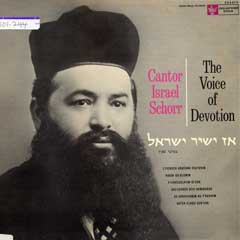One of the most well-known concert items in the Cantors’ repertoire is “Sheyibaneh Bet Hamikdash,” that was popularised by Chazan Moshe Kussevitsky. However, it’s only aficionados who will be aware that the composer, Chazan Israel Schorr, also recorded it himself.
The association of Kussevitsky with this piece demonstrates how composers often get forgotten, while the performers of their works can become famous. People who don’t know too much about the background to Chazanut will often speak of Sirota’s “Retsei” or Hershman’s “Tikanta Shabbat,” being totally unaware that these Chazanim did not compose all the pieces that they sang, they just performed them. Indeed, just as Opera singers don’t write the operas, so there were, and still are, very few Chazanim who write the pieces that they sing.
There are many very fine composers, who do not have the ability to perform their compositions, just as there is a large number of performers who don’t have the creative talent to write.
As far as “Sheyibaneh Bet Hamikdash,” and this composer are concerned, it is a shame that it became so closely associated with another Chazan, since Israel Schorr was in fact, a very fine Chazan in his own right, and his own recording of it is very beautiful.
Schorr was born in Chyrov, Austria into a well-known Chassidic family. As a child he had a beautiful soprano voice and frequently sang in the presence of the Rymanover Rebbe.
At the age of 18 he went to Lemberg to become Chazan and he stayed there until the outbreak of WW1. He served in the Austrian Army, but was excused combat duty because of his religious principles.
After the war, he served as Chazan in Brunn, Czechoslovakia – Cracow, Poland – and Piestyan in Hungary.
Schorr wanted to go to the USA but encountered some difficulties in obtaining a visa. In the meantime, he was invited to conduct services in Zurich and, so successful was he there, that he came back for seven successive Shabbatot.
He eventually obtained the necessary papers and arrived in America in 1924.
Israel Schorr served as Cantor in Brooklyn and then in the Bronx and often appeared in concerts with Rosenblatt.
Unfortunately he had a heart condition and officiated for the last time at the congregation Chovevei Torah, Brooklyn in 1934.
Sadly, he died at the very early age of 49 on April 9th 1935.
Although, as already noted, Israel Schorr’s composition “Sheyibaneh Bet Hamikdash” was made famous by Moshe Kussevitsky, this was not the only one of his pieces to find favour with other performers.
He composed “Hateh Elokai,” from Selichot – also made famous by Kussevitsky, as well as “Lefichach Ananachnu,” a concert item, with which Leibele Waldman is associated.
© Copyright Rabbi G. Shisler
Source: Chazzanut Online


